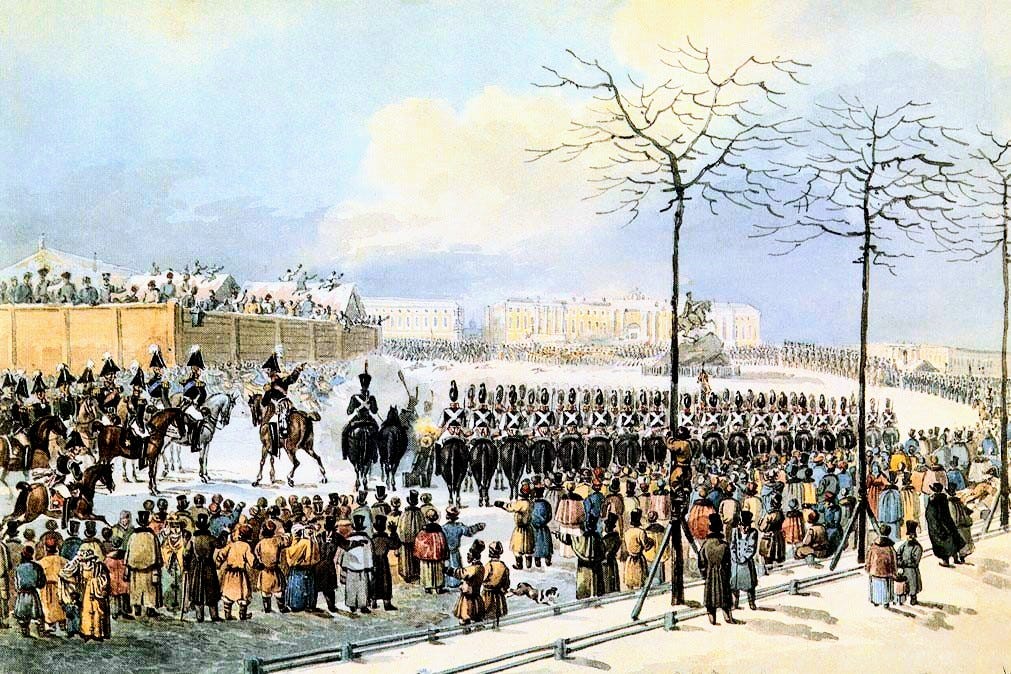The Decembrist Revolt: The Arrival of the French Revolution in Russia and the Birth of a Revolutionary Tradition
This is the first post to only be available to paid subscribers since the newsletter started in January 2022. I’ve gone back and forth about what to do on this front. For the time-being, the idea I have settled on is to keep most of the posts free access but have one or two articles each month only for paid subscribers. See how it goes. As before, there is not a schedule, as such, at “It Can Always Get Worse”. Thanks everyone for reading and to all who have subscribed.
— Kyle
Russian Tsar Alexander I (r. 1801-25) was in many ways an Enlightenment figure, and the first half of his reign was characterised by notable openness compared with his predecessors. But Alexander’s struggle with the French Revolution, embodied in Napoleon Bonaparte, and the spread of revolutionary conspiracies within the Empire influenced by French ideas, led to a retrenchment after 1815. The most important such conspiracy had been detected just before Alexander’s sudden death in December 1825. Amid the confusion about the succession between two of Alexander’s brothers, Konstantin and Nicholas, the Jacobin-inflected conspirators within the military, known as “the Decembrists”, took their chance, orchestrating a two-stage rebellion, in Saint Petersburg and Ukraine, intended to liquidate the Tsardom. The Decembrist Revolt is simultaneously a singular event and a marker of the beginning of the Russian revolutionary movement, which would develop over the next century, coalescing into a terrorist cult and ultimately triumphing in 1917 in the form of the Bolsheviks.
REFORM IN RUSSIA AND THE FRENCH REVOLUTION
The eighteenth-century Enlightenment had culminated in the French Revolution in 1789: the rule of hereditary monarchs, answerable only to God, was over; now there would be popular sovereignty, answerable to its reason. When it transpired that majority sentiment did not look favourably on murdering their King after a show trial, the massacre of priests, and uprooting the Roman Catholic Church, the Revolution put its ideas above actual human beings. Liberty would be enforced with Terror, most notably against the brave people of the Vendée.1 The Jacobins and other factions of the Revolution were universalist in outlook: they would not be selfish with their revelations; having brought France out of darkness, they set about bringing light to the rest of the earth’s benighted peoples, plunging the European Continent into a quarter-century of killing and turmoil.
Alexander I’s grandmother, Empress Ekaterina II or “Catherine the Great” (r. 1762-96), an archetypal “Enlightened despot”, had tried to reform the great machinery of the Russian state,2 yet been unable to escape the arbitrary power of her office.3 It was Ekaterina on watch when the Bastille was stormed: while publicly regarding all that followed with horror, she did not commit to any of the efforts of the Christian powers to quarantine the Revolution. Ekaterina’s successor, her despised son, Pavel I (r. 1796-1801), immediately began Germanizing reforms domestically that would have affronted his mother—and did affront most of the Russian elite—and when he changed Russia’s foreign policy, shortly after Napoleon’s coup in 1799, to align with France, it was the final straw: he was murdered in a palace coup that brought his son, Alexander I, to power.
The story of Alexander’s reign is told in Simon Sebag Montefiore’s The Romanovs. Alexander was very much within the Enlightenment current, a liberal by instinct, detesting serfdom and wanting to introduce constitutional mechanisms, and he was surrounded by some people of even more radical temperament, though found himself in the same paradoxical position as his grandmother, needing to hold on to autocracy to implement Enlightened reforms. Alexander’s plan for a firm neutrality between Napoleon’s institutionalised Revolution and the ancien régimes was quickly derailed.4 Alexander’s first foray into war, alongside Britain and Austria, in 1805-06, was a disaster, and a personal one: Alexander’s micromanaging actively made things worse, especially at the Battle of Austerlitz in November 1805, a month after British independence was secured by defeating the French in the great naval contest at Trafalgar. In July 1807, Alexander was forced to come to terms with Napoleon, meeting for a famous summit at Tilsit. For a time, the Continent was divided between France and Russia, and the two turned on Britain.5 But Alexander was a quick learner.
Tilsit had an almost romantic air to it, as the two Enlightenment Emperors charmed one-another, conversing in French. Napoleon did actually write later of Alexander: “Were he a woman, I think I’d make him my lover.” But Alexander knew the game: he put no stock in “the language of Tilsit”. The Tsar’s short-term bid for glory foiled, Alexander switched to a long-term strategy, writing soon after Tilsit to his mother—who was leading the opposition in Court to the French alliance—that the national interest was to “do everything to prove the sincerity” of Russia’s “tight alliance with France”, right up until “the moment when we will calmly observe [Napoleon’s] fall”. In the meanwhile, Alexander exploited the alliance with Napoleon, who never understood the Russian leadership regarded him as a godless monstrosity, to seize Finland from Sweden in 1808.6



